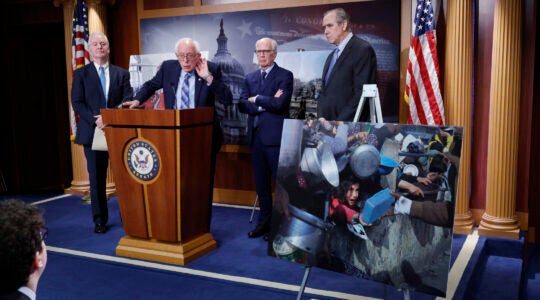NEW YORK, Jan. 4 (JTA) — Jewish leaders were scrambling this week to figure out how they would be affected by New York Gov. Eliot Spitzer’s executive order banning junkets for executive branch officials sponsored by outside groups. Spitzer on Monday banned members of his administration from accepting any gift — including support-building missions to Israel — that might permit the inference of being intended “to influence the individual in the performance of official business.” After a Jewish Week inquiry Tuesday, Michael Miller, executive director of the Jewish Community Relations Council of New York, said he would review the matter to see if it would have any impact on JCRC’s annual missions to Israel. Although those delegations most often consist of ethnic community leaders and clergy, and key city and state legislators, they have also included appointed members of state government. “We are looking into whether this poses a problem,” Miller said. “We need to engage in a discussion with our counsel and with people in the administration.” A comment from Spitzer’s press office was not immediately available Tuesday. Spitzer was sworn in Monday as governor. His reform wasn’t the only measure creating angst in the pro-Israel community. On the federal level, the fervor among the new Democratic leadership on Capitol Hill to restrict lobbyist-sponsored perks for members of Congress caused concern at AIPAC, the pro-Israel lobby. But its leaders reportedly are satisfied with measures that would allow delegations to foreign countries with pre-approval and post-trip debriefing by ethics committee members. Miller could not recall how many appointed administration officials have participated in JCRC missions over the years, but mentioned as one Elizabeth Moore, then a counsel to Gov. Mario Cuomo in the early 1990s and now a member of Spitzer’s transition team. Since 1982, UJA-Federation of New York and its beneficiary, the JCRC, have taken more than 500 community leaders, elected officials and/or their staff members to Israel to learn about and better understand the economic, political and security challenges. By providing these leaders firsthand exposure to Middle East realities as seen by Israelis, the missions serve both short- and long-term goals: planting seeds of support in communities across the area and investing goodwill among local officials who may one day have to deal with foreign policy issues. Some of the local officials treated to an Israel trip have gone on to become members of Congress. Support for Israel in Albany has also produced some tangible benefits for the Jewish state: New York operates a business office in Jerusalem to explore trade potential, and the state’s pension fund routinely invests in State of Israel Bonds. Jerry Goldfeder, an election lawyer and Democratic activist, said he doubted that such missions would be construed as an attempt to sway state policy. “If it’s purely an educational trip for members of government to know and understand the State of Israel and people of Israel, I can’t imagine anyone would perceive that as trying to influence governmental policy,” he said. Goldfeder added, “The impulse to reform is extremely important, but may have unintended consequences.” The other reform orders signed by Spitzer on Tuesday post new restrictions on lobbying, further limit the use of state resources — such as vehicles and computers — by employees and bar candidates from appearing in state commercials. Ron Soloway, UJA-Federation’s managing director for governmental and external relations, said he also was studying the executive order to see if it would impact the Israel trips. But he said “most of the other reforms are good government reforms and we are supportive of them.” He welcomed in particular the measure that would require greater disclosure of initiative funding by legislators, known as member items. “We are fully supportive of that transparency because we believe that the money our agencies get and the services they provide are extremely valuable,” Soloway said. He added, “We think member items play a vital role because they fill gaps in services.”
JTA has documented Jewish history in real-time for over a century. Keep our journalism strong by joining us in supporting independent, award-winning reporting.





